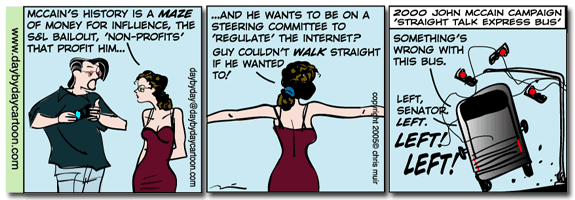Scott Johnson of Power Line writes a powerful argument about the true intent of the BCRA and its carefully selected targets in today’s Daily Standard. Titled “Dream Palace of the Goo Goos,” Johnson’s article points out the hypocrisy of sanitizing political speech in an era where the courts have permitted all kinds of activity to act as speech, therefore granting them the protection of the First Amendment umbrella:
Even if the McCain-Feingold law and the “press exemption” are unclear on the extent of their application, wouldn’t the First Amendment protect freedom of speech on the Internet? The Supreme Court’s modern First Amendment jurisprudence has afforded Constitutional protection to such vital speech as nude dancing, flag burning, simulated online child pornography, and sexually explicit cable programming. Surely the First Amendment protects the rights of bloggers to express themselves on the Internet as they see fit in connection with elections to federal office?
The First Amendment itself speaks to the point with great clarity: “Congress shall make no law . . . abridging the freedom of speech, or of the press . . . ” And there is no gainsaying that the core purpose of the First Amendment is the protection of political speech. Yet the Supreme Court has beat a remarkable retreat in the face of the congressional onslaught on political speech in the name of campaign-finance reform. In its decision affirming the constitutionality of the basic provisions of the McCain-Feingold bill, the Supreme Court has already demonstrated that it cannot be counted on to protect the right of free speech in the context of campaign-finance law. In affirming the constitutionality of the McCain-Feingold bill’s key provisions, the court cut Congress substantial slack to regulate otherwise protected speech in the name of “preventing corruption or the appearance of corruption.”
But Scott finds his most devastating argument in the dissent of Justice Antonin Scalia, whose words in opposition to the BCRA sound as those of a true seer. Scalia went through the Congressional debates of both McCain-Feingold and Shays-Meehan which created the BCRA, and had much more of a grasp on the true intent of the BCRA’s muzzle than his colleagues (emphases mine):
[L]et us not be deceived. While the Government’s briefs and arguments before this Court focused on the horrible “appearance of corruption,” the most passionate floor statements during the debates on this legislation pertained to so-called attack ads, which the Constitution surely protects, but which Members of Congress analogized to “crack cocaine,” 144 Cong. Rec. S868 (Feb. 24, 1998) (remarks of Sen. Daschle), “drive-by shooting[s],” id., at S879 (remarks of Sen. Durbin), and “air pollution,” 143 Cong. Rec. 20505 (1997) (remarks of Sen. Dorgan). There is good reason to believe that the ending of negative campaign ads was the principal attraction of the legislation. A Senate sponsor said, “I hope that we will not allow our attention to be distracted from the real issues at hand-how to raise the tenor of the debate in our elections and give people real choices. No one benefits from negative ads. They don’t aid our Nation’s political dialog.” Id., at 20521–20522 (remarks of Sen. McCain). He assured the body that “[y]ou cut off the soft money, you are going to see a lot less of that [attack ads]. Prohibit unions and corporations, and you will see a lot less of that. If you demand full disclosure for those who pay for those ads, you are going to see a lot less of that . . . .” 147 Cong. Rec. S3116 (Mar. 29, 2001) (remarks of Sen. McCain). See also, e.g., 148 Cong. Rec. S2117 (Mar. 20, 2002) (remarks of Sen. Cantwell) (“This bill is about slowing the ad war. . . . It is about slowing political advertising and making sure the flow of negative ads by outside interest groups does not continue to permeate the airwaves”); 143 Cong. Rec. 20746 (1997) (remarks of Sen. Boxer) (“These so-called issues ads are not regulated at all and mention candidates by name. They directly attack candidates without any accountability. It is brutal . . . . We have an opportunity in the McCain-Feingold bill to stop that . . .”); 145 Cong. Rec. S12606–S12607 (Oct. 14, 1999) (remarks of Sen. Wellstone) (“I think these issue advocacy ads are a nightmare. I think all of us should hate them . . . . [By passing the legislation], [w]e could get some of this poison politics off television”).
So what are all of these Senators decrying? The ads used by outside interest groups to highlight real and perceived deficiencies in an incumbent’s voting record. Why did outside groups run these ads? Thanks to earlier, misdirected attempts to “reform” campaign financing, candidates and political parties couldn’t raise enough money to do that themselves. Instead, the money flowed to PACs, which then worked with the campaigns, allowing a reduced if still open responsibility on the candidates for the message. (Now, with coordination completely outlawed, the money flows to groups which spout messages with no responsibility whatsoever.)
In other words, as Scalia pointed out to the Supreme Court, BCRA never amounted to anything more or less than an attempt by the entrenched political class to stifle criticism and protect their incumbencies.
Does this mean that the attacks will go away now? Hardly, and that’s where the FEC comes in. With readership soaring on the blogosphere, the campaigns and the partisans will find ways to get the information needed to independent voices, such as bloggers, to report to their readers. Once that happens, the FEC will come under Congressional pressure to enforce an ever-widening net of legislation ostensibly to protect virgin American eyes and ears from “poison politics”, but truly to save these pork-barrel incumbents’ bacon.
Make sure you read all of Scott’s analysis.

